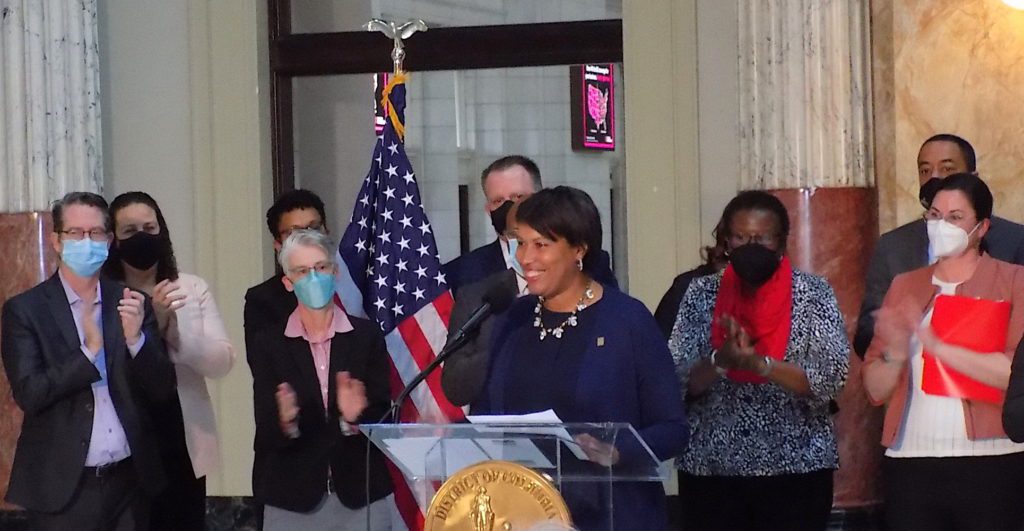Mayor Announces Build Back Better Infrastructure Task Force
By • March 24, 2022 0 1080

Mayor Muriel Bowser announced the creation of the DC Build Back Better Infrastructure Task Force on Thursday. It will advise on priority projects to be funded through President Biden’s Bipartisan Infrastructure Law, she said.
“We have a once-in-a-generation opportunity to transform our infrastructure, to get people back to work, and to get people better connected across our city,” Bowser said at Union Station, while referring to New York City’s Moynihan Train Hall, and added of the D.C. transportation landmark’s proposed modernization, “This can be bigger and better.”
“President Biden’s Bipartisan Infrastructure Law will be transformational for our country, and this task force will ensure D.C. is ready to secure and deploy the funding that becomes available in very intentional ways,” Bowser said. “We believe we have a strong model in the Frederick Douglass Memorial Bridge project – not only a model for D.C. but for the nation. With that project, local and federal government worked together, we contracted with local businesses and put residents to work, and we built a bridge that is sustainable, resilient, and that our community can be proud of. Now, we want to replicate that model to invest in our roads, bridges, and pipes, to better connect D.C., and of course, to renovate and expand Union Station.”
The Task Force, according to the mayor, is “made up of experts from District agencies and external partners, and will ensure the District’s effectiveness in securing and deploying federal dollars while creating transformative, equitable, and sustainable projects that will impact residents across the District and generations of Washingtonians to come.… The Task Force will make recommendations on how to prioritize projects that can be funded through the Bipartisan Infrastructure Law, including formula and competitive grants, and solicit feedback from the public and external stakeholders.”
The DC Build Back Better Task Force is made up of members chosen for their expertise in one of the five subcommittees: Transportation Innovation, Technology Innovation, Workforce Capacity Building, Environment and Resilience, and Administration, Compliance and Procurement. An executive committee will review initial committee findings and guide the overall process.
Initial Appointments – DC Build Back Better Infrastructure Task Force Members
Executive Committee Members
Co-chair Former Transportation Secretary Rodney Slater
Co-chair Jan Adams, President and CEO, JMA Solutions
Jenny Reed, Director, Office of Budget and Performance Management
Lucinda Babers, Deputy Mayor for Operations and Infrastructure
Tommy Wells, Director, Department of Energy & Environment
Deryl McKissack, President and CEO of McKissack & McKissack
Environment and Resilience Subcommittee
Brandi Collander, Chair of the Board of Directors, DC Green Bank
Liz DeBarros, Interim CEO, District of Columbia Building Industry Association
David Gadis, Chief Executive Officer and General Manager, DC Water
Eli Hopson, CEO, DC Green Bank
Emile C. Thompson, Interim Chairman, Public Services Commission
Transportation Innovation Subcommittee
Everett Lott, Director, District Department of Transportation
Dan Tangherlini, Former Administrator, U.S. General Services Administration
Cheryl Cort, Director of Policy, Coalition for Smarter Growth
Ketan Gada, Director, Hill East District Redevelopment
Technology Innovation Subcommittee
Co-chair Gabe Klein, Founder of Cityfi
Co-chair Lindsey Parker, Chief Technology Officer and Assistant City Administrator
Anita Cozart, Interim Director, Office of Planning
Blue Jenkins, President, Washington Gas
Workforce Capacity Building Subcommittee
Co-chair Dr. Unique Morris-Hughes, Director, Department of Employment Services
Akosua Ali, President, NAACP Washington, DC Branch
Dyanna Forester, President, Metro Washington Council, AFL-CIO
Dr. Amber Hewitt, Chief Equity Officer
Otto Madrid, President of the DC Hispanic Contractors Association
Ahnna Smith, Executive Director, DC Workforce Investment Council
Kristi Whitfield, Director, Department of Small and Local Business Development
Administration, Compliance and Procurement Subcommittee
George Schutter, Chief Procurement Officer, Office of Contracting an Procurement
When considering which projects should be prioritized, the Task Force will consider recommendations that will improve economic opportunities for historically disadvantaged communities, create greater equity amongst D.C. neighborhoods and residents, withstand future shocks and stressors, and accommodate growth throughout the District. Project recommendations must meet three core principles:
- Transformational – Big, creative ideas that do away with historical barriers and ensure systems and resources are combined to build back better;
- Equitable – Cement racial equity into all stages of the projects;
- Sustainable – Address the climate crisis and build resiliency while also being able to continue when the Bipartisan Infrastructure Law funding is no longer available.
For more information on the DC Build Back Better Infrastructure Task Force, visit infrastructure.dc.gov.

